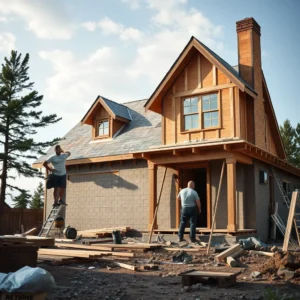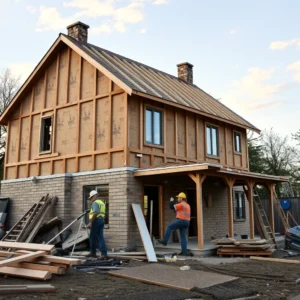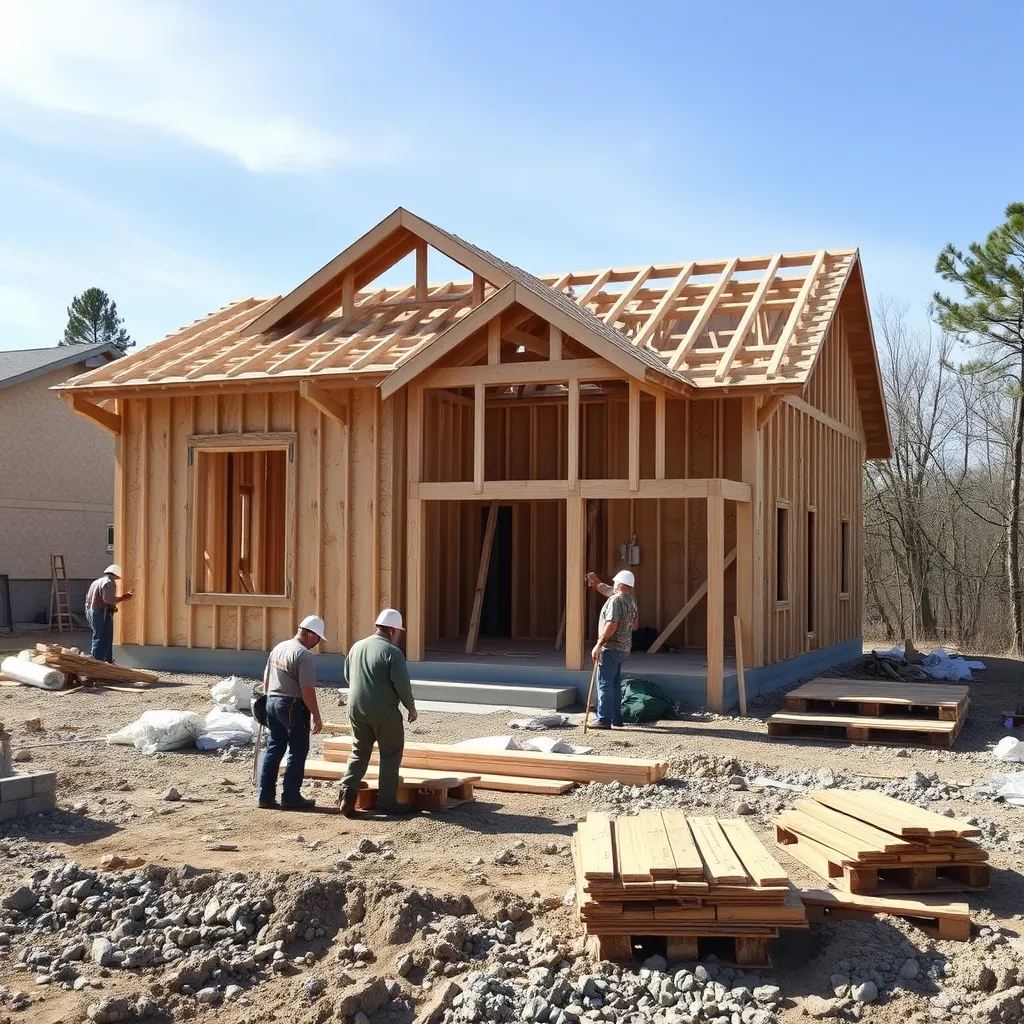New construction home loans are specialized financing options designed for individuals building a new home from scratch. These loans differ from traditional mortgages in several key aspects, tailored to meet the unique requirements of new construction projects. When purchasing a newly constructed home, buyers should be aware of the specific financing options available.
New construction home loans typically involve a more complex appraisal process, as the property’s value is based on the projected value of the completed home rather than an existing structure. The terms and conditions of new construction home loans often differ from traditional mortgages. One notable difference is the disbursement of funds, which is usually tied to specific milestones in the construction process.
This ensures that the loan amount is released in stages as the building progresses. Understanding the intricacies of new construction home loans is crucial for potential borrowers. Familiarizing oneself with the requirements, processes, and unique features of these loans can help individuals make informed decisions about their financing options when building their dream home.
Key Takeaways
- New construction home loans are specifically designed for financing the construction of a new home.
- Benefits of new construction home loans include lower interest rates, flexible terms, and the ability to customize your home.
- Qualifying for a new construction home loan typically requires a good credit score, stable income, and a down payment.
- Types of new construction home loans include construction-to-permanent loans, stand-alone construction loans, and renovation loans.
- Finding the right lender for your new construction home loan is crucial for getting the best terms and rates.
Benefits of New Construction Home Loans

Customization and Control
One of the primary advantages of new construction home loans is the ability to customize the home to fit the buyer’s specific needs and preferences. Unlike purchasing an existing home, building a new construction home allows for greater control over the design and layout of the property.
Competitive Interest Rates and Flexible Terms
New construction home loans often come with competitive interest rates and flexible terms, making them an attractive option for many homebuyers. This can result in lower monthly payments and more manageable mortgage terms.
Energy Efficiency and Cost Savings
Another benefit of new construction home loans is the potential for increased energy efficiency and lower maintenance costs. New homes are often built with modern materials and technology that can result in lower utility bills and reduced maintenance expenses over time. Additionally, new construction homes typically come with warranties that can provide peace of mind for homeowners.
Qualifying for a New Construction Home Loan

Qualifying for a new construction home loan involves meeting certain criteria set by lenders. In general, lenders will look at factors such as credit score, income, employment history, and debt-to-income ratio when evaluating a borrower’s eligibility for a new construction home loan. Additionally, lenders may require a larger down payment for new construction home loans compared to traditional mortgages, as there is typically more risk involved in financing a property that has not yet been built.
Potential borrowers should also be prepared to provide detailed plans and specifications for the new construction project, as well as a timeline for completion. Lenders will want to ensure that the project is feasible and that the borrower has a clear plan for completing the construction on time and within budget. Working with a reputable builder and having a solid understanding of the local building codes and regulations can also play a crucial role in qualifying for a new construction home loan.
Types of New Construction Home Loans
| Loan Type | Down Payment | Credit Score Requirement | Interest Rate |
|---|---|---|---|
| Conventional Loan | 5% – 20% | 620+ | 3.00% – 4.00% |
| FHA Loan | 3.5% | 580+ | 3.25% – 4.50% |
| VA Loan | 0% | No minimum | 2.25% – 4.00% |
| USDA Loan | 0% | 640+ | 2.75% – 3.75% |
There are several types of new construction home loans available to borrowers, each with its own set of features and requirements. One common type of new construction loan is the construction-to-permanent loan, which allows borrowers to finance both the construction phase and the permanent mortgage with a single loan application and closing. This type of loan can streamline the financing process and may offer lower closing costs compared to obtaining separate construction and permanent loans.
Another option is the stand-alone construction loan, which provides funding specifically for the construction phase of the project. Once the construction is complete, borrowers can then apply for a separate mortgage to pay off the construction loan. Stand-alone construction loans may be ideal for individuals who already own the land on which they plan to build and are looking for short-term financing to cover construction expenses.
Additionally, some lenders offer renovation loans that can be used to finance both the purchase of a property and the cost of renovations or improvements. These loans can be a great option for individuals looking to purchase a fixer-upper or make significant upgrades to an existing home. Understanding the different types of new construction home loans available can help borrowers choose the option that best fits their specific needs and financial situation.
Finding the Right Lender for Your New Construction Home Loan
Finding the right lender for a new construction home loan is essential for a smooth and successful financing process. It’s important for borrowers to research and compare different lenders to find one that offers competitive rates, flexible terms, and excellent customer service. Working with a lender who has experience with new construction projects can also be beneficial, as they will have a better understanding of the unique requirements and challenges associated with financing a new build.
In addition to traditional banks and credit unions, there are specialized lenders who focus specifically on new construction home loans. These lenders may offer more tailored financing options and have a deeper understanding of the intricacies involved in funding a new construction project. Borrowers should also consider working with a mortgage broker who can help them navigate the various loan options available and connect them with lenders that best fit their needs.
When evaluating potential lenders, borrowers should consider factors such as reputation, responsiveness, and transparency. Reading reviews and testimonials from previous clients can provide valuable insight into a lender’s track record and customer satisfaction. Ultimately, finding the right lender is crucial for securing favorable terms and ensuring a positive experience throughout the new construction home loan process.
The Process of Obtaining a New Construction Home Loan

Pre-Qualification and Pre-Approval
During the initial stage, borrowers provide their financial information to the lender, who assesses their eligibility for a loan based on factors such as credit score, income, and debt-to-income ratio. This step gives borrowers an idea of how much they can afford to borrow and helps them narrow down their options when selecting a lender.
Finalizing the Loan Application
Once pre-qualified or pre-approved, borrowers work with their chosen lender to finalize their loan application and gather additional documentation required. This may include detailed plans and specifications for the new construction project, as well as information about the builder and timeline for completion. The lender reviews the application and makes a decision about whether to approve the loan based on the borrower’s financial profile and the feasibility of the project.
Construction and Loan Disbursement
After approval, the next step is to secure a construction contract with a reputable builder who will oversee the project from start to finish. The lender disburses funds at various stages of the construction process, based on predetermined milestones such as pouring the foundation, completing framing, and finishing interior work.
Transition to Permanent Mortgage
Once the construction is complete, the loan transitions into a permanent mortgage, allowing borrowers to begin making regular payments on their new home.
Tips for Successfully Navigating the New Construction Home Loan Process

Successfully navigating the new construction home loan process requires careful planning and attention to detail. One important tip is to start early and do thorough research on lenders, loan options, and builders before committing to any specific financing or construction plans. It’s also crucial to have a clear understanding of all costs associated with building a new home, including land acquisition, permits, materials, labor, and any unexpected expenses that may arise during the construction process.
Communication is key throughout the entire process, from working with lenders and builders to coordinating inspections and ensuring that all necessary documentation is in order. Staying organized and keeping detailed records can help prevent delays or misunderstandings that could potentially derail the project. Additionally, being proactive about addressing any issues or concerns that arise during construction can help keep the project on track and minimize potential setbacks.
Finally, it’s important for borrowers to stay informed about changes in interest rates or market conditions that could impact their financing options. Working closely with their lender and staying up-to-date on industry trends can help borrowers make informed decisions about when to lock in their interest rate and move forward with their new construction project. By following these tips and staying proactive throughout the process, borrowers can increase their chances of successfully navigating the new construction home loan process and achieving their goal of building their dream home.
FAQs
What is a new construction home loan?
A new construction home loan is a type of loan specifically designed for individuals looking to finance the construction of a new home. This type of loan differs from traditional home loans, as it provides funding for the construction process rather than the purchase of an existing home.
How does a new construction home loan work?
New construction home loans typically work in stages, with the lender providing funds at different points throughout the construction process. These funds are often released in increments as the construction reaches certain milestones, such as the completion of the foundation, framing, and finishing touches.
What are the requirements for obtaining a new construction home loan?
Requirements for obtaining a new construction home loan may vary depending on the lender, but generally, applicants will need to provide detailed construction plans, a budget for the project, and a down payment. Lenders may also require a good credit score and proof of income.
What are the benefits of a new construction home loan?
One of the main benefits of a new construction home loan is that it provides financing specifically tailored to the construction process, allowing borrowers to fund the building of their dream home. Additionally, these loans often offer flexible terms and may provide options for refinancing once the construction is complete.
What are the potential drawbacks of a new construction home loan?
One potential drawback of a new construction home loan is that they can be more complex and may require more documentation than traditional home loans. Additionally, the construction process itself can be unpredictable, which may lead to unexpected costs or delays.

